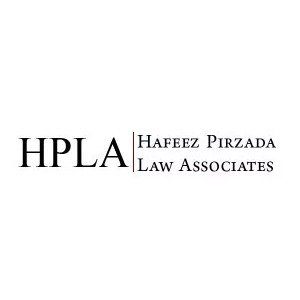Best Reinsurance Lawyers in Karachi
Share your needs with us, get contacted by law firms.
Free. Takes 2 min.
List of the best lawyers in Karachi, Pakistan
About Reinsurance Law in Karachi, Pakistan
Reinsurance, often described as insurance for insurers, is a vital component of the insurance industry. It involves one insurer, the ceding company, purchasing insurance from another insurer, the reinsurer, to mitigate risk. In Karachi, Pakistan, reinsurance plays a crucial role due to the significant economic activities and investments in the city. The industry is regulated by local laws and international treaties to ensure a well-functioning financial market, offering stability to the primary insurance market. The Securities and Exchange Commission of Pakistan (SECP) supervises this sector, ensuring compliance with the country's financial regulations.
Why You May Need a Lawyer
Navigating the complexities of reinsurance can be challenging, and various circumstances may necessitate seeking legal assistance:
- Complex Contractual Terms: Reinsurance agreements can be dense, with intricate clauses that might be difficult to understand without legal expertise.
- Disputes and Claims: Conflicts may arise between the ceding company and the reinsurer regarding coverage, liability, or claims, requiring legal intervention for resolution.
- Compliance Issues: Ensuring adherence to local and international regulations can require legal consultation to avoid potential penalties.
- Regulatory Changes: Changes in local laws or international regulations can impact reinsurance operations, necessitating legal advice to stay compliant.
- Asset and Liability Management: Legal guidance can help manage financial risks associated with reinsurance portfolios.
Local Laws Overview
Understanding the legal framework surrounding reinsurance in Karachi is crucial:
- Insurance Ordinance, 2000: Governs the overall insurance sector, including reinsurance operations in Pakistan.
- Securities and Exchange Commission of Pakistan (SECP): The regulatory body overseeing the insurance and reinsurance markets, ensuring transparency and protection for both insurers and policyholders.
- Reinsurance Regulations: Guided by SECP guidelines, these regulations outline the permissible practices for reinsurers operating in Karachi.
- Compliance with International Standards: Reinsurers are often required to adhere to globally accepted standards and practices, such as those established by the International Association of Insurance Supervisors (IAIS).
Frequently Asked Questions
What is reinsurance?
Reinsurance is a process where an insurance company (the cedent) transfers part of its risk to another insurance company (the reinsurer) to reduce the likelihood of having to pay a large obligation resulting from an insurance claim.
Why would an insurance company seek reinsurance?
Insurance companies seek reinsurance to reduce their risk exposure, stabilize financial performance, increase underwriting capacity, and protect against catastrophic events.
How is reinsurance regulated in Karachi?
The Securities and Exchange Commission of Pakistan (SECP) regulates reinsurance practices, enforcing standards that promote fairness, transparency, and financial stability.
What are the types of reinsurance available?
Reinsurance is typically divided into two main types: facultative reinsurance (covers individual risks) and treaty reinsurance (covers a portfolio of policies).
Can individuals purchase reinsurance?
No, reinsurance is generally not available to individuals; it is designed for insurance companies to manage their own risk profiles.
What is a reinsurance premium?
A reinsurance premium is the payment made by the ceding company to the reinsurer for assuming a portion of risk.
What happens if a reinsurer defaults?
If a reinsurer defaults, the ceding company may face financial challenges and may need to seek alternative recovery through legal channels or other insurance arrangements.
Do local laws apply to international reinsurance contracts?
Yes, local laws apply, but international treaties and agreements may also influence contract terms, depending on the parties involved and jurisdictions in question.
Who oversees compliance in the reinsurance sector in Pakistan?
The SECP is responsible for overseeing and ensuring compliance with reinsurance laws and regulations in Pakistan.
Is reinsurance mandatory for insurance companies in Pakistan?
While reinsurance is not legally mandatory, it is strongly advisable for risk management purposes and to meet regulatory solvency requirements.
Additional Resources
For those seeking further information, the following resources can be highly beneficial:
- Securities and Exchange Commission of Pakistan (SECP): They provide guidelines, regulations, and updates concerning the reinsurance and broader financial market sectors.
- Pakistan Reinsurance Company Ltd (PRCL): A key player in the market, offering products and insights into the industry.
- Karachi Insurance Institute: Provides educational resources and training about insurance and reinsurance.
- Local Law Firms with Insurance Law Expertise: Consulting with firms that specialize in insurance and reinsurance law can provide targeted legal advice.
Next Steps
If you find yourself in need of legal assistance regarding reinsurance matters in Karachi, consider the following steps:
- Research: Start by researching local laws and understand the basics of your legal issue.
- Consultation: Schedule consultations with legal experts or law firms that specialize in reinsurance law in Karachi.
- Documentation: Gather all relevant documents and correspondence related to your reinsurance matter for your legal consultant.
- Follow Expert Advice: Once you have retained a lawyer, follow their guidance and keep abreast of your case progress.
Engaging with knowledgeable legal professionals will be invaluable in navigating the complexities of reinsurance regulations and ensuring your legal and financial interests are adequately protected.
Lawzana helps you find the best lawyers and law firms in Karachi through a curated and pre-screened list of qualified legal professionals. Our platform offers rankings and detailed profiles of attorneys and law firms, allowing you to compare based on practice areas, including Reinsurance, experience, and client feedback.
Each profile includes a description of the firm's areas of practice, client reviews, team members and partners, year of establishment, spoken languages, office locations, contact information, social media presence, and any published articles or resources. Most firms on our platform speak English and are experienced in both local and international legal matters.
Get a quote from top-rated law firms in Karachi, Pakistan — quickly, securely, and without unnecessary hassle.
Disclaimer:
The information provided on this page is for general informational purposes only and does not constitute legal advice. While we strive to ensure the accuracy and relevance of the content, legal information may change over time, and interpretations of the law can vary. You should always consult with a qualified legal professional for advice specific to your situation.
We disclaim all liability for actions taken or not taken based on the content of this page. If you believe any information is incorrect or outdated, please contact us, and we will review and update it where appropriate.















